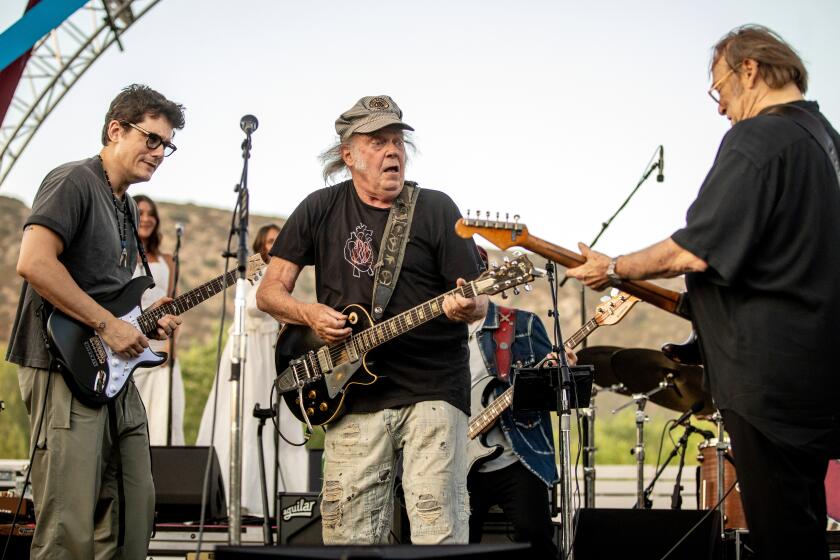Station Still Seeking Right Numbers : Programming: In the year since KCSN-FM switched from country to classical, ratings and fund raising have shown no real improvements.
Last November, when KCSN-FM switched from George Strait to Stravinsky, the station aimed to solicit more listeners and financial support, and appease a university community opposed to country programming.
One year has passed, and only one thing has changed.
“We’re at peace with the university,” said Ken Mills, the station’s general manager. KCSN (88.5) is a public radio station licensed to Cal State Northridge. “That’s been our biggest gain.”
Other gains were anticipated in the Arbitron ratings--radio’s equivalent of television’s Nielsens--and in the money collected by KCSN’s fund-raising drives. But the ratings, according to Mills, have shown no perceptible improvement, and the station has raised nearly the same amount of money as it did under the country format.
“It disappoints me,” Mills said. “But I don’t think we’ve given the classical format the time to evaluate its effectiveness. Any format change needs a couple of years to reach its potential.”
Ronnie Mack, host of the weekly Barn Dance concert at North Hollywood’s Palomino, formerly broadcast on KCSN, said the ratings confirm that the station made the switch “only because of the university.” Mack, along with other devoted country music followers, contended that the switch removed a vital radio outpost for country music performers in the San Fernando Valley. The station now features bluegrass Saturdays from 7:30 a.m. to 1 p.m. as its sole country programming.
“And it wasn’t just for the musicians; it helped out the public too,” Mack said recently. “There is a market for that stuff. We just need people to hear it. The artists could have used that time on the radio to promote their records, and themselves. There is definitely a void because of that.”
Mack continues to search for another station to broadcast his popular Barn Dance, which presents local country music performers every Tuesday night. He said two local stations have expressed interest in putting the show on television.
Mills said KCSN, while sympathizing with country fans, wanted to capture some of the listeners who felt abandoned when KFAC-FM (92.3) switched from classical to rock in September, 1989. Mills also said he was constantly confronted by people who “wanted to know when I was going to get the country music off the air.”
While they have not given as much money as Mills had hoped, classical music lovers appreciate KCSN’s presence.
“We’re in a battle with all the rock stations,” said Elliot Kaplan, a film composer and member of the Committee for Classical Music, which was formed after KFAC’s change. “After KFAC, it was so apparent that there was a need for a classical music station, and they’ve done a wonderful job here. The university should be represented by the best artifacts of our culture.”
It was that kind of implication--country music isn’t good enough for the university--that insulted KCSN’s country listeners at the time of the format change. Mack and other Barn Dance regulars scoffed at the suggestion that country music lacked sophistication.
“The fact is, though, they played people like Chet Atkins and Roy Clark, who were classically trained musicians,” Mack said, “and headlined symphony orchestras. That kind of assertion comes from people who never listened to the station.”
Kaplan, interviewed by Mills on the air as part of the station’s recent fund-raising drive, said he never intended to denigrate country music, but was opposed to it as the “sole representation” for the university’s radio station. He said he is pleased to have bluegrass on the station. “I believe there should be a variety of forms presented,” he said.
But the bulk of its programming, more than 100 hours per week, is classical music. In a year, the station has amassed about 1,200 classical compact discs and has about 40 volunteers who help out. The station plays music from symphonies across the country and work by famous artists.
“It really has become a classical station, especially for the Santa Clarita Valley,” said Mills, referring to support the station receives from students and faculty in the music department at CalArts. “That’s where the station has made its impact.”
In its fund-raising drive, which ended earlier this month, Mills said the station raised about $31,000, compared with $38,000 raised in a similar campaign last year immediately before the station changed formats. Also, the latest Arbitron ratings, released in the summer, showed that the station had about 32,000 weekly listeners. He said the average ratings during the last year of KCSN as a country station averaged about 30,000.
More to Read
The biggest entertainment stories
Get our big stories about Hollywood, film, television, music, arts, culture and more right in your inbox as soon as they publish.
You may occasionally receive promotional content from the Los Angeles Times.








